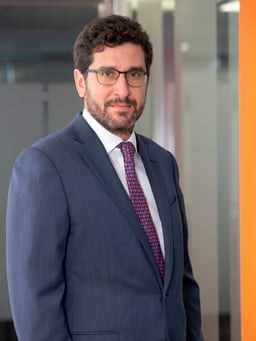Ashveen Gopee, Managing Partner
What do you see as the main points that differentiate PwC Legal (Mauritius) from your competitors?
PwC Legal (Mauritius) key differentiators are rooted in its integrated service offerings and commitment to excellence. We also stand out through our global reach, industry-specific expertise, commitment to innovation, client-centric approach, and strong ethical standards.
These differentiators enable us to provide exceptional legal services that help our clients achieve their business objectives and navigate complex legal landscapes with confidence. Our key differentiators can be bracketed as follows:
Integrated Services within the PwC Global Legal and PwC Global Network
As part of the PwC Global Legal Business Solutions Network and the PwC Global Network (together the PwC Network), our close collaboration with other professional services within the PwC network is a cornerstone of our approach to delivering comprehensive and effective solutions to our clients.
This cross-functional collaboration allows us to provide comprehensive solutions that address the multifaceted needs of our clients and ensures that our clients receive holistic advice that considers all aspects of their business. For example, when advising on a corporate restructuring, our legal team works closely with tax advisors to ensure that the restructuring is tax-efficient and compliant with all relevant regulations.
Our integrated approach is facilitated by seamless communication and coordination across our network. This ensures that our clients benefit from the collective knowledge and expertise of PwC professionals worldwide, regardless of their location.
Global Reach with Local Expertise
PwC Legal (Mauritius) leverages the extensive global network of PwC Legal Business Solutions and PwC, which spans over 150 countries. This global presence enables us to offer our clients unparalleled access to international markets and cross-border legal expertise. At the same time, our deep understanding of the local legal landscape in Mauritius ensures that we provide tailored advice that is both relevant and effective in the local context.
Industry-Specific Knowledge
We have a strong focus on industry-specific legal services, which allows us to deliver highly specialized advice. Our team possesses in-depth knowledge and experience in key sectors such as:
financial services,
hospitality,
medical,
construction
insurance and emerging sectors such as:
renewable energy,
blockchain technology.
This sectoral expertise enables us to anticipate industry trends and provide proactive legal solutions that help our clients stay ahead of the curve.
Commitment to Innovation and Technology
PwC Legal (Mauritius) is at the forefront of leveraging technology to enhance the delivery of legal services. We utilize advanced legal tech tools and platforms to streamline processes, improve efficiency, and provide more accurate and timely advice. Our commitment to innovation ensures that we are constantly evolving to meet the changing needs of our clients in an increasingly digital world.
Which practices do you see growing in the next 12 months? What are the drivers behind that?
At PwC Legal (Mauritius) we have seen an investment trend which is Africa centric in general and specific industry focused such as green energy, virtual assets and the blockchain technology.
Mauritius, as an International Financial Centre of excellence, continues to be a pivotal player in regional and global structuring. This continuing strategic importance of Mauritius, the opportunities presented by the Africa Continental Free Trade Area (AfCFTA), the world’s largest free trade area, and the global shift towards sustainable and innovative financial solutions will generate an evolving economic landscape and emerging trends that will drive growth in several key practice areas:
Funds and Investment Structuring With the growth of the single African market through the African Continental Free Trade Area (AfCFTA), there is an increasing demand for sophisticated funds and investment structuring. We expect to see a surge in the establishment of investment funds, private equity, and venture capital structures aimed at tapping into the burgeoning African market.
Banking and Financing The banking and financing sector in Mauritius is poised for further growth, driven by the need for innovative financial solutions to support regional and international trade. The development of new financial instruments and the expansion of banking services to cater to the needs of businesses operating within the AfCFTA framework will be key drivers.
Mergers and Acquisitions (M&A) We are living in an ever-increasing financial and geo-political dynamic era. Business interests and risk exposures are constantly evolving. We are seeing and anticipating business structuring and heightened interest from international investors seeking to capitalize on growth opportunities in the region.
Green Energy Funding There is a growing interest in the funding of green energy projects as the world shifts towards sustainable development. We have been actively involved in advising clients which are using Mauritius as a test lab and showcase for renewable energy initiatives. We have seen collaboration between Mauritius and large economies, such as India, for the local market but also outbound. We expect this practice area to see significant growth.
Tokenization and Blockchain Technology The adoption of blockchain technology and the tokenization of assets are gaining traction as innovative ways to access liquidity in various industries, including mining. Tokenization allows for the fractional ownership of assets, making it easier to raise capital and enhance liquidity. The use of blockchain technology ensures transparency, security, and efficiency in transactions. We have been particularly involved in advising clients on the legal implications and regulatory compliance related to blockchain and tokenization, and we foresee this area playing an increasingly important role in the financial landscape.
3. What's the main change you've made in the firm that will benefit clients?
We are constantly striving to innovate and provide unparalleled value to our clients. One of the most significant changes we have implemented is the establishment of the PwC Legal Academy. This initiative is designed to address atypical but highly relevant and avant-garde issues that are crucial for supporting the industry.
PwC Legal Academy: Addressing Cutting-Edge Issues
The PwC Legal Academy is a platform where we conduct workshops and training sessions on contemporary issues that are often overlooked but have a significant impact on the workplace. For instance, our maiden workshop focused on cyberbullying within the workplace—a prevalent issue that many organizations struggle to address effectively. By providing insights and strategies to tackle such challenges, we empower our clients to create safer and more inclusive work environments.
Additionally, we have explored other avant-garde topics such as the impact of social media on the workspace. Our workshops delve into the delicate balance between freedom of expression and the employer's right to protect itself from potential abuse of social media that could adversely affect the organization.
By staying ahead of these emerging issues, we equip our clients with the knowledge and tools to navigate the complexities of the modern workplace.
Enhanced International Collaboration: Leveraging Global Competence
On an international level, we have strengthened our collaboration with our Africa legal network by setting up and driving structured regular meetings. These meetings allow us to stay in close touch with what other Legal Business Solutions are doing and offering. By tapping into complementary competencies and competence across our global legal network, we can provide more comprehensive and effective services to our clients.
This enhanced international collaboration ensures that we bring world-class expertise and innovative solutions to our clients' benefit. By leveraging the collective knowledge and experience of our global network, we can address complex legal challenges with a more holistic and informed approach.
4) Is technology changing the way you interact with your clients, and the services you can provide them?
At PwC Legal (Mauritius), we are dedicated to continuously improving our services to better meet the needs of our clients. One of the most impactful changes we have recently made is to opt for the integration of Harvey AI, a specialized artificial intelligence platform which uses sophisticated machine learning algorithms and natural language processing, into our legal practice.
Our adoption of Harvey AI underscores our commitment to innovation and staying at the forefront of legal technology. We believe that embracing such advancements is crucial in delivering superior legal services in today's fast-paced and ever-evolving business environment. This forward-thinking approach not only benefits our current clients but also positions us as a leader in the legal industry, capable of adapting to future challenges and opportunities
The integration of Harvey AI into PwC Legal (Mauritius) represents a transformative change that significantly enhances our efficiency, accuracy, and client service. This innovation, coupled with our leadership in the AI space, ensures that we continue to deliver exceptional value and maintain our competitive edge in the legal market.
By incorporating AI into our practice, we are able to offer a more responsive and tailored service to our clients. The insights generated by Harvey AI enable us to provide more informed and strategic guidance, closely aligning with our clients' specific needs and objectives. This technological advancement also allows us to be more proactive in identifying potential legal issues and opportunities, thereby enhancing the overall client experience.
Furthermore, tasks that were traditionally time-consuming can now be completed much more rapidly, freeing up our legal professionals to focus on more complex and strategic aspects of client matters. This increased efficiency ensures that we can deliver on our clients' needs more promptly and effectively.
It is also worth mentioning that our involvement with Harvey AI extends beyond mere implementation. I am proud to serve on the Harvey AI Africa Steering Committee.
3) Can you give us a practical example of how you have helped a client to add value to their business?
At PwC Legal (Mauritius), our innovative approach and global reach enable us to provide cutting-edge solutions that add significant value to our clients' businesses.
Blockchain in the mining industry
Recently, we were approached by a client in the mining sector who was seeking access to liquidity to finance their operations. Recognizing the potential of emerging technologies, we proposed a blockchain strategy to address their needs. Our team worked closely with the client to develop a plan for issuing stablecoins (new regulatory framework regarding stablecoins is impending) and security tokens, leveraging blockchain technology to create new financing opportunities.
This strategy represents a novel approach in the mining sector. By utilizing blockchain, the client can potentially access a broader range of investors and secure the necessary funds more efficiently. This innovative solution not only addresses the client's immediate liquidity needs but also positions them at the forefront of technological advancements in their industry.
Our ability to integrate legal expertise with cutting-edge technology demonstrates how PwC Legal (Mauritius) can deliver strategic, innovative, and impactful solutions that drive our clients' success.
6) Are clients looking for stability and strategic direction from their law firms - where do you see the firm in three years’ time?
In today's rapidly changing and uncertain environment, clients are increasingly seeking stability and strategic direction from their law firms.
The evolving geopolitical landscape and unforeseen challenges underscore the importance of having a reliable and forward-thinking legal partner.
Seeking assistance from our global legal network which has also reach to other extra-legal services to put at the disposal of the client is the starting point of any global client to re-think stability and strategy.
Future Vision for PwC Legal (Mauritius)
Expanding Global and Regional Role
Over the next three years, we envision PwC Legal (Mauritius) playing an even more prominent role on both the global and regional stages. Our affiliation with the PwC network allows us to leverage a vast array of resources and expertise, enabling us to offer comprehensive legal solutions that address the multifaceted needs of our clients.
We plan to continue expanding our service offerings, both individually and through our global and Africa legal networks, to better serve our clients' diverse requirements.
Leadership in AI and Technology
We also see ourselves as a leading firm in the integration of AI and technology within the legal sector. Our recent collaboration with Harvey AI and our active participation in the Harvey AI Africa Steering Committee highlight our commitment to staying at the forefront of technological advancements.
Embracing New Law
In addition to our technological advancements, we are also committed to embracing the concept of "New Law". This approach involves leveraging on technology to rethink traditional legal service delivery models to incorporate more flexible, efficient, and client-focused methods.
Commitment to Innovation and Excellence
Our dedication to innovation and excellence will continue to drive our growth and success. We believe that by staying ahead of emerging trends and best practices, we can offer our clients the highest level of service and support. This forward-thinking approach not only benefits our current clients but also positions us as a leader in the legal industry, capable of adapting to future challenges and opportunities.



